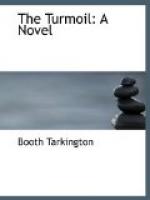He had kept his voice cheerful as he spoke, but he had grown a shade paler, and there was a latent anguish deep in his eyes. He may have known it and wished her not to see it, for he turned away.
“You do that all day long?” she asked, and as he nodded, “It seems incredible!” she exclaimed. “You feeding a strip of zinc into a machine nine hours a day! No wonder—” She broke off, and then, after a keen glance at his face, she said: “I should think you would have been a ’bad hand at it’!”
He laughed ruefully. “I think it’s the noise, though I’m ashamed to say it. You see, it’s a very powerful machine, and there’s a sort of rhythmical crashing—a crash every time the jaws bite off a circle.”
“How often is that?”
“The thing should make about sixty-eight disks a minute—a little more than one a second.”
“And you’re close to it?”
“Oh, the workman has to sit in its lap,” he said, turning to her more gaily. “The others don’t mind. You see, it’s something wrong with me. I have an idiotic way of flinching from the confounded thing—I flinch and duck a little every time the crash comes, and I couldn’t get over it. I was a treat to the other workmen in that room; they’ll be glad to see me back. They used to laugh at me all day long.”
Mary’s gaze was averted from Bibbs now; she sat with her elbow resting on the arm of the chair, her lifted hand pressed against her cheek. She was staring at the wall, and her eyes had a burning brightness in them.
“It doesn’t seem possible any one could do that to you,” she said, in a low voice. “No. He’s not kind. He ought to be proud to help you to the leisure to write books; it should be his greatest privilege to have them published for you—”
“Can’t you see him?” Bibbs interrupted, a faint ripple of hilarity in his voice. “If he could understand what you’re saying—and if you can imagine his taking such a notion, he’d have had R. T. Bloss put up posters all over the country: ’Read B. Sheridan. Read the Poet with a Punch!’ No. It’s just as well he never got the—But what’s the use? I’ve never written anything worth printing, and I never shall.”
“You could!” she said.
“That’s because you’ve never seen the poor little things I’ve tried to do.”
“You wouldn’t let me, but I know you could! Ah, it’s a pity!”
“It isn’t,” said Bibbs, honestly. “I never could—but you’re the kindest lady in this world, Miss Vertrees.”
She gave him a flashing glance, and it was as kind as he said she was. “That sounds wrong,” she said, impulsively. “I mean ‘Miss Vertrees.’ I’ve thought of you by your first name ever since I met you. Wouldn’t you rather call me ’Mary’?”
Bibbs was dazzled; he drew a long, deep breath and did not speak.
“Wouldn’t you?” she asked, without a trace of coquetry.




